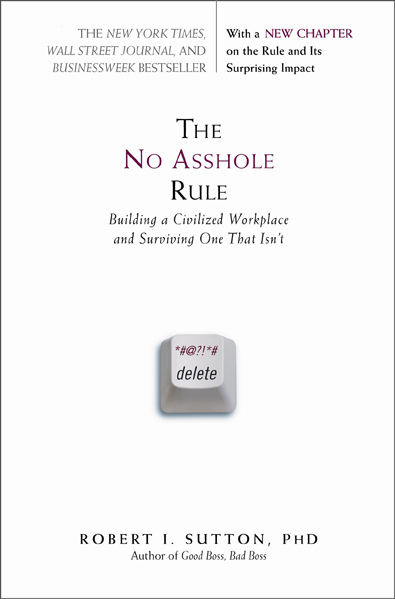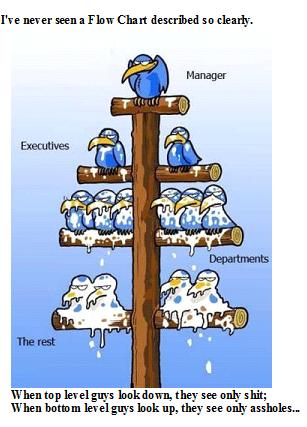In the fog of my first couple weeks after surgery, I missed some intriguing developments. Thanks to you folks who read this blog, I got some great emails to help me stay in the loop. As I was wrestling with my email inbox last night, I found a note from Patrick with a link to a fantastic — troubling, enlightening, and funny — story at cracked.com (which looks to me like a cross between Mad magazine and The Onion, but is more fact-based — they apparently have been around since 1958) on The Five Biggest Assholes Who Ever Turned Out to Be Right, which was posted on April 23rd.
I was taken by the post because the author, Dan Seitz, did such a great job of finding people who were annoying, nasty, stubborn, mean-spirited, and otherwise socially inept or personally despicable, but had championed unpopular but good ideas (or in some cases, ideas that were just different from the prevailing wisdom but they were dismissed because the ideas were advocated by an alleged asshole). I urge you to read this quite detailed story, where you can learn about the exploits, quirks, and ideas of alleged assholes including baseball player Jose Canseco (he claimed that many stars, including himself, were using steriods, which turned out to be true), scientist Peter Duesberg (very unpopular because he claimed that AIDS is not caused by HIV, which made him so unpopular that his colleagues and others have — until recently — been ignoring his potentially breakthrough work on the causes of cancer), Harry Markopolos (who admits that he combines the worst characteristics of a math nerd and frat boy — but spent 9 years pressing his accusations that Bernie Madoff was running a Ponzi scheme).
My favorite asshole who was right, however, is Fritz astronomer. See this description from the American Museum of Natural History for more details. But as Seitz tells us:
 To give you an idea of how charming Fritz Zwicky was, when he was
To give you an idea of how charming Fritz Zwicky was, when he was
working at Aerojet, a bunch of customers from the military, including
two admirals, showed up for an appointment to check on his progress.
Zwicky met them at the gate demanding that they leave
because they weren't scientists and were therefore absolutely
unqualified to look at the stuff they were, um, buying. Outside of work,
his solution to winning arguments was to try and punch people, which
was mostly found adorable because he was a little old man who could be
pummeled easily. It became less adorable when he said things like "I myself can think of a
dozen ways to annihilate all living beings in one hour," and his
scientific partner was afraid Zwicky was out to kill him.
BUT he was right in serious ways, even though it took decades for his colleagues to find that out because they thought these were just wacky ideas from "Crazy Fritz" (pictured to the left). As Seitz tells it:
Needless to say, the whole "total lack of people skills" thing made
him so popular and beloved he got the nickname "Crazy Fritz." So it was
easy to ignore Zwicky while he was off doing crazy things like inventing
most of modern astronomy.
The term "supernova"? He invented it.
Plus:
He also developed the theory that allows us to know how old the
universe is. Dark matter? He was among the first to theorize about it.
Gravitational lensing, i.e. using stars to look at other stars? He laid
out the theory 40 years before it was actually proved correct. Zwicky was so ahead of his time, and so annoying, that it was
basically routine in the 70s to say "Yeah, Fritz Zwicky thought of this
40 years ago but nobody took him seriously because he was a crazy
douche."
Stories like these, especially the one about Fritz, are important to remember because — although people who are stubborn, trample over everyone else, are unable or unwilling to use the most basic social graces, and treat others like dirt clearly deserve to be called assholes and may not be worth the trouble no matter how brilliant they are — they are less burdened than most of us by pressures to think like everyone else. They may be in a better position, as the first scientist to isolate Vitamin C — Albert Szent-Gyorgi — famously suggested (I am paraphrasing), "To look at the same thing as everyone else, but to think of and see something different."
I wrote a lot about people with this talent in Weird Ideas That Work, especially in the chapter on "slow learners." I would also add, however, that there are many people who think for themselves and stubbornly stick to unpopular ideas regardless of social pressures and prevailing wisdom, but aren't assholes. A good example was Nobel Prize winner Richard Feynman, who did irritate people by pushing ideas they disagreed with, but was known as usually charming and well-loved. He won a Nobel Prize on Physics and many experts believe he deserved one, possibly two, others (e.g., Feynman solved a problem that another researcher won another Nobel for years later — but the paper with the solution just sat in his drawer for many years because he never got around to sending the paper to an academic journal).
He also "went rogue" as member of the Rogers Commission that investigated the explosion of the Challenger Space Shuttle — and despite pressures to stop from the head of it — did his own interviews with NASA scientists and engineers that led him to believe that the explosion was caused by O-rings that failed under cold temperatures. If you have never seen it, his demonstration to congress (which some members of the commission tried to stop) that when an O-ring was put in beaker of cold water, it became brittle and more likely to break, was the pivotal moment in the investigation — it is a beautiful example of breaking down a problem to its esssence. Feynman's role on the Rogers Commission is instructive because, although he fought with the head of the commission William Rogers about the independent action he took and was famously called "a real pain" by Rogers, he wasn't doing it to be an asshole. He was doing to get to the truth. Rogers probably thought he was an asshole, which reminds me that it is label that people should hesitate to use and accept as true, because it is often applied simply to people who disagree with us, are more successful than us, or who simply act or think differently than than us.
If you are in a group or organization where people who simply look, think, or act differently than everyone else are labeled as assholes, and the best you can be is a perfect imitation of everyone else around you, well, the odds are no one is thinking very much and there isn't much original thinking going on.
In short, although being oblivious or indifferent (or naive, by the way) to what others thing can help people see and develop new ideas (and is a hallmark of assholes at times), I think it is important to keep in mind that not all original thinkers are assholes (the trick is to see things differently and not to cave in when people don't like your "different ideas"). I should also point out that not all assholes are original thinkers. There are plenty of mean-spirited jerks out there who mindlessly follow the crowd and are incapable of original thinking.
P.S. Also note that the post at Cracked reminds us of another cost that assholes inflict on themselves and others — if you are branded as an asshole, people are more likely to reject your ideas, even if they are right. The negative reactions they have to YOU color their reactions to your ideas. One solution, by the way, is if you are an asshole with good ideas, you might work with a more socially adept partner who is more skilled at selling your ideas.


